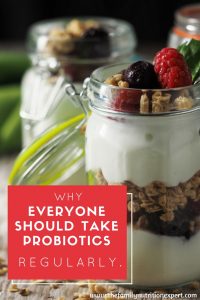 I’m really passionate about digestive issues and how to resolve problems from within using the right food, drink and supplements. This week I’m looking at how we can all help our tummies to be happier – one way to do this is by including beneficial bacteria and probiotics in your diet and supplement regime.
I’m really passionate about digestive issues and how to resolve problems from within using the right food, drink and supplements. This week I’m looking at how we can all help our tummies to be happier – one way to do this is by including beneficial bacteria and probiotics in your diet and supplement regime.
I believe that everyone should take probiotics regularly. Scientific studies continue to show that probiotics, or beneficial bacteria, can do so much good for our bodies.
I’ve been using them for years to help support digestive problems and balance my clients’ immune systems. But there’s now rising evidence that the power of our microflora goes far beyond the gut.
What are probiotics?
Probiotics are live, friendly bacteria and yeast that can help to support the health of your digestive system, as well as aiding your body’s ability to absorb nutrients, fight infections and keep your immune system balanced.
We have billions of organisms inside our bowels… in fact there are far more of these little creatures than there are cells in your body! Research is even showing us that these organisms may have a role to play in how we lose weight and can even help to balance our cholesterol levels.

How can probiotics help me?
Probiotics can help restore the natural balance of bacteria in your gut when it has been disrupted by an illness, medical treatment, antibiotics, stress and of course, a high sugar or white carb diet. Many probiotic supplements also contain prebiotics, which help to feed the good organisms and help them to grow.
By adding in the good guys and the food to help them grow, you’ll ensure a good balance and wide diversity of beneficial organisms.
Whilst I’m a big believer that diet should always come first, there are a few key supplements that I would advise most people to take on a regular basis. These include Vitamin D3, a good quality multi vitamin and mineral or superfood, plus probiotics.
Your gut is one of the most important organs in your body, but its health is often overlooked and its importance to our immune system almost always underestimated. So many long-term health problems and chronic illnesses originate in our gut, in fact without enough beneficial organisms in your body you could develop a multitude of health problems, including IBS, chronic fatigue, bloating and flatulence, skin disorders, frequent thrush infections and increased susceptibility to colds and flu.
Much research has been undertaken to prove that there are many health benefits to adding probiotics to our diets, including:
- Probiotics to support those with ADD – There’s evidence that taking high doses of some probiotics (Lactobacillus rhamnosus or Saccharomyces boulardii) may help those with ADD and also those on the autism spectrum.
- Probiotics may help infectious diarrhoea – Evidence shows that probiotics, particularly the probiotic yeast Saccharomyces Boulardii can shorten an episode of diarrhoea caused by a stomach bug by about a day. Whenever I’m travelling, I always make sure we’ve had a good dose of probiotics for a couple of weeks before, during and after, with some extra Saccharomyces Boulardii to take in case diarrhoea strikes.
- Probiotics may help prevent allergies – The Swansea probiotics trial has shown that giving pregnant women probiotics in the last trimester, and then supplementing babies in the first year of life, may help to reduce allergies.
- Probiotics may help IBS – Probiotics may help to reduce bloating and flatulence in some people with IBS, and this is certainly something I’ve seen in my clinic having worked with hundreds of people with IBS. Although probiotics won’t help everyone with IBS, the National Institute for Health and Care Excellence (NICE) suggests taking them for at least four weeks, to see if they make a difference. Probiotics can also help protect the bowel against leaky gut.
- Probiotics may help if you’re lactose intolerant – Lactose intolerance is a common digestive problem in which the body is unable to digest lactose (a type of sugar found mainly in milk and dairy products). Some studies have found that certain probiotics, such as Lactobacillus acidophilus, may help to reduce the symptoms of lactose intolerance (including stomach cramps, flatulence and diarrhoea). This is because beneficial bacteria help to make the lactase enzyme that breaks down lactose.
Where can beneficial bacteria be found?
There are some natural food sources of beneficial bacteria. These include:
- Plain natural yoghurt, Kefir
- Sauerkraut and pickles
- Miso
- Cottage cheese
- Sourdough bread
There are also many probiotic milk or yoghurt drinks available in the high streets, however the quality and levels of beneficial bacteria tend to vary dramatically. Many contain a lot of sugar and they have a long shelf life, which cannot guarantee how live the bacteria are once they reach you. I advise people not to buy these, and instead get a good quality probiotic supplement.
Probiotic Supplements
Probiotic supplements come as powders, tablets, capsules and liquids. You can also get probiotic supplements specifically for babies and young children. These are usually powders which can easily be added to drinks or food – just don’t put them into hot food as this may destroy the bacteria. There are many different strains of beneficial bacteria, so it’s best to look for a broad spectrum probiotic which contains at least 5 billion live bacteria from a mixture of strains.
I like the probiotic supplement Biokult. There are many other probiotic supplements and strains which I also advise in specific circumstances, but it’s best to consult a practitioner such as myself for advice on these.
Click here to buy Biokult from the Orange Grove Clinic Online Shop
 Finding out your levels of beneficial bacteria and yeast
Finding out your levels of beneficial bacteria and yeast
As part of my Nutritional Health Coaching packages, I offer a number of Comprehensive Stool Testing services which can reveal your levels of at least 5 of the key beneficial bacteria strains in your gut, so that you know which you may be low in. The test can also check for dysbiosis, which is when non-beneficial organisms can overgrow, as well as checking for parasites and candida and other yeast overgrowth. Prices start at £165 for the test, plus consultation package prices.
If you have a poor immune system, IBS or any digestive issue, then taking probiotics is a great first step in improving your gut health. Do remember that to feel the full benefits you also need to look at your diet and lifestyle as a whole.
Cut down on processed, refined white foods where you can, replacing them with wholesome, healthy nutritious meals that are rich in vegetables, fibre and protein. It’s also a good idea to cut down on the amount of sugar in your diet – something my 30 Day Sugar Detox online course can help you get started with straight away!
If you suffer from IBS, regular bloating or uncontrollable flatulence there may be deeper issue that needs addressing. To work with me on a 1-2-1 basis, take a look at my Nutritional Coaching Packages.